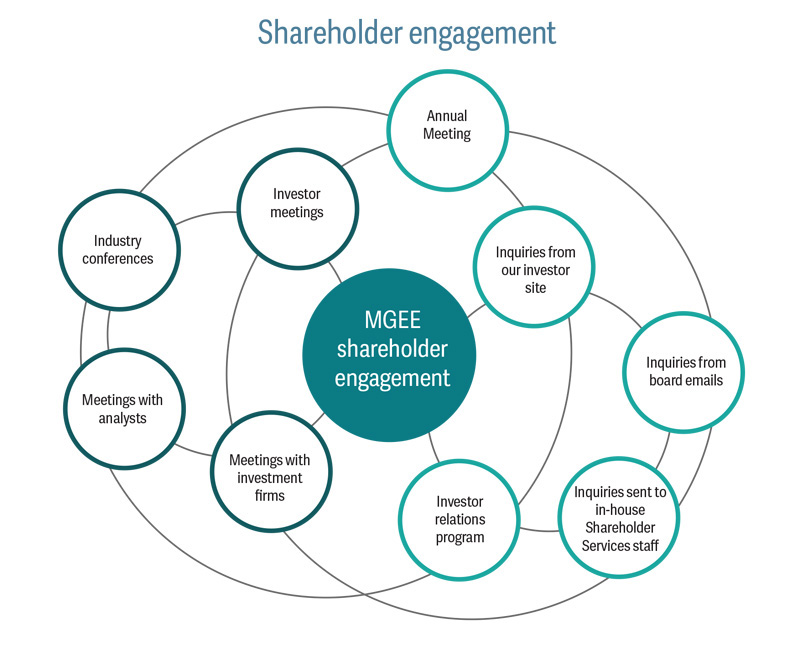Governance and Oversight
Our Board of Directors has a commitment to corporate responsibility and environmental accountability. Community-focused and with a breadth and diversity of experience, board members bring strong, effective oversight in their service to MGE and MGE Energy.
Board engagement
Our board is very active and engaged with 10 regularly scheduled meetings of the full board each year, in addition to committee meetings. These meetings help directors stay well-informed of industry and company developments.
Board meetings are structured to provide for regular presentations and active dialogue with MGE management. Internal and external subject matter experts present to the board on issues of strategic importance to inform board members’ decision-making and oversight.
In fall 2020, the board held a strategic planning and review session with all officers of the company. This session was designed to review corporate strategy across all aspects of the company’s business and to provide directors with the opportunity to engage the entire senior management team on issues of strategic importance. The board holds strategic planning and review sessions with all officers periodically.

Effective oversight
Directors understand corporate responsibility and sustainability are integral to the company’s long-term success and share management’s commitments in these areas, from long-term and strategic direction to day-to-day business practices companywide. Each director is expected to examine all major issues affecting an organization and must be committed to the highest ethical standards, accountability, transparency and open dialogue with one another and with management to provide effective oversight.
The board has four standing committees. All members of the Corporate Governance Committee, Audit Committee and Compensation Committee are considered independent. The Executive Committee acts in lieu of the full board and between meetings of the board. The Executive Committee has the powers of the board in the management of the business and affairs, except action with respect to dividends to shareholders, election of principal officers or the filling of vacancies on the board or committees created by the board. Since the board meets 10 times a year, the Executive Committee has not needed to meet or to take action.
Oversight of ESG matters
Board oversight includes review of environmental risks and mitigation as well as assessment of current and/or future environmental regulations. It also includes review of the company’s environmental and sustainability performance.
In 2018, MGE moved from biennial to annual production of our Environmental and Sustainability Report, which in 2020 has become the company’s Corporate Responsibility and Sustainability Report to reflect more accurately the range of content provided in the report. This report is reviewed by the board every year.
Executive compensation
MGE Energy’s Board of Directors’ Compensation Committee, composed of independent directors, takes into consideration environmental performance, among other factors such as cost containment and management of day-to-day operations, when evaluating executive compensation. The committee also considers other performance goals, such as earnings, system reliability and customer satisfaction as well as long-term strategic goals, including those related to sustainability.
As part of its ongoing assessment of corporate performance, the board regularly reviews how well the company is advancing its overall goals around carbon emissions reductions as well as progress on its specific strategies for deep decarbonization.
MGE Energy’s annual Proxy Statement provides a full explanation of the company’s corporate governance practices and responsibilities. It is available at mgeenergy.com/proxy.
State and federal oversight
As a public utility, MGE operates under state and federal regulations. These regulations serve to protect the interests of customers, employees, investors and the environment. MGE is subject to regulation by the Public Service Commission of Wisconsin (PSCW), which has authority to regulate most aspects of MGE’s business, including rates, terms and conditions of service, accounts, issuance of securities and construction of infrastructure, such as generation siting.
The Federal Energy Regulatory Commission (FERC) has jurisdiction, under the Federal Power Act, over certain accounting practices and certain other aspects of MGE’s business. MGE Energy’s subsidiaries also are subject to regulation under local, state and federal laws regarding air and water quality and solid waste disposal.
Risk management
Enterprise-wide risk assessment and oversight are fundamental responsibilities of our board. Directors are involved in the process of overseeing the primary risks facing the company. As part of the company’s Enterprise Risk Management program, our board receives on an ongoing basis information from management related to key business risks and mitigation strategies. These business risks include existing and emerging risks related to environmental performance and sustainability.
Our board engages in a comprehensive risk assessment and mitigation review biannually. In addition, on a biennial basis, the board engages in a broad-based exercise with all company officers on risk and emerging risk identification, assessment and mitigation strategies. This review last occurred in 2019.
The company’s comprehensive approach to risk management encourages all directors to initiate discussion at any time, either directly or through the Lead Independent Director, on any areas of concern, including risk identification and assessment, controls, management, and oversight. The board and MGE management have created a culture of environmental sustainability and risk management. All officers of the company take ownership in and are accountable for managing and mitigating corporate risk.
Environmental Management System
Additionally, MGE is employing an independent third party to oversee the expansion of the company’s Environmental Management System (EMS). In 2017, MGE expanded the scope of its renewed five-year contract with the Wisconsin Department of Natural Resources for its Green Tier certification, which recognizes environmental leadership. The primary goal in the expanded contract is to cover all MGE operations under the EMS. More information on the EMS is available under “Comprehensive risk minimization” in the Safety and Operations section.
The company’s independent third-party’s expertise in risk management and compliance is helping MGE to identify operational and environmental risks and to evaluate those risks under the scope of the expanded EMS. This further demonstrates MGE’s commitment to goal-setting and to environmental accountability.
Ongoing board education
The board’s regular interactions with internal and external subject matter experts provide useful information and insight relative to critical business initiatives and corporate strategy. These interactions inform the board’s understanding of the company’s financial performance, environmental performance, risk management and oversight, and succession planning.
Board members also have direct access to a network of resources and ongoing educational opportunities that support their ability to provide effective oversight and governance on a broad range of critical issues. This direct access includes director training and resources from:
- The National Association of Corporate Directors, an organization dedicated to advancing broad-based director education, including on governance and emerging issues;
- PricewaterhouseCoopers (PwC), which offers events and resources for directors to stay current on environmental, social and governance (ESG) topics, risk, and other board responsibilities; and
- The Edison Electric Institute (EEI) and the American Gas Association (AGA), which also offer ESG-related topics specific to the energy industry.
Climate change and environmental expertise
The board has engaged and plans to continue to engage widely recognized scientific experts on topics related to climate change. This is in addition to the board’s and company management’s regular engagement on emerging environmental risks and risk mitigation from internal subject matter experts. MGE management brings considerable environmental expertise as well as expertise in environmental law to the company.
In 2019, MGE management began working with experts from the University of Wisconsin-Madison’s Nelson Institute for Environmental Studies to evaluate the company’s net-zero carbon by 2050 goal in the context of the October 2018 special report on global warming of 1.5 degrees Celsius by the Intergovernmental Panel on Climate Change. In early 2020, the board discussed the work of these experts to evaluate the company’s goal and strategies for achieving deep decarbonization by mid-century. See the Strategy and Climate section for details of this independent analysis.
Board independence
The board makes an annual assessment of the independence of directors under the independence guidelines adopted by Nasdaq Stock Market, Inc. Those guidelines are generally aimed at determining whether a director has a relationship which, in the opinion of the MGE Energy board, would interfere with the exercise of independent judgment in carrying out director responsibilities. The guidelines identify certain relationships that are considered to affect independence, such as a current or past employment relationship with the company, the receipt by the director or one of his or her family members of compensation in excess of $120,000 from the company for other than board or board committee service and commercial relationships exceeding specified dollar thresholds. These guidelines also are reflected in MGE Energy’s Corporate Governance Guidelines, which are available at mgeenergy.com/governance.
The board has determined that seven of the nine directors are independent under the Nasdaq Stock Market, Inc., definition of independence and the company’s Directors Independence Standards, which parallel the Nasdaq Stock Market, Inc., definition. All members of the Corporate Governance Committee, Audit Committee and Compensation Committee are considered independent.
More information about the board is available in the company’s annual Proxy Statement at mgeenergy.com/proxy.
Code of Ethics
The board has a Code of Ethics applicable to all directors, officers and employees of the company. The company’s Code of Ethics includes: conflict of interest; confidential and insider information; gifts, gratuities and favors; proper accounting and reporting; outside employment; government relations; political contributions and political office; company property; and reporting illegal or unethical behavior. To review the company’s Code of Ethics, visit mgeenergy.com/governance.
Shareholder engagement
Our board believes that understanding and considering shareholder perspectives advances accountability and transparency. Our investor relations efforts also help executive management and the board understand how investors view the company’s policies and practices, strategies and long-term direction, and help leadership assess and address investors’ emerging areas of interest, such as ESG-related topics.
Officers engage shareholders in several ways, including through discussions with a number of our institutional shareholders; presentations at industry conferences and investor meetings; meetings with analysts and investment firms; our Annual Meeting; and inquiries taken through the company’s investor site, board email and in-house Shareholder Services staff. These efforts are in addition to the company’s regular and ongoing investor relations program.

About this report
MGE’s 2020 Corporate Responsibility and Sustainability Report has been prepared to share matters of performance and of interest to stakeholders. This report includes forward-looking statements and estimates of future performance that may differ from actual results because of uncertainties and risks encountered in day-to-day business. For additional information, news and updates, and the company’s EEI ESG/sustainability reporting templates, visit mgeenergy.com/environment.
As part of our commitment to transparency and disclosure, we have reviewed the recommendations of the Task Force on Climate-related Financial Disclosures (TCFD), performed an analysis of our disclosures relative to the TCFD recommendations and determined that our companywide disclosures are consistent with and responsive to the TCFD guidance and recommendations.
Our Corporate Responsibility and Sustainability Report is organized to be consistent with the disclosure framework identified by the TCFD. We are committed to helping customers, investors and other stakeholders better understand our strategies, risks, challenges and opportunities as we transition to a more sustainable future.
Additional disclosures can be found in our 10-K and 10-Q, Proxy Statement and filings with the Public Service Commission of Wisconsin.